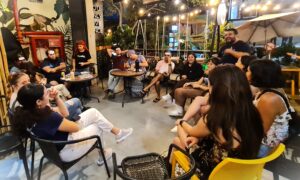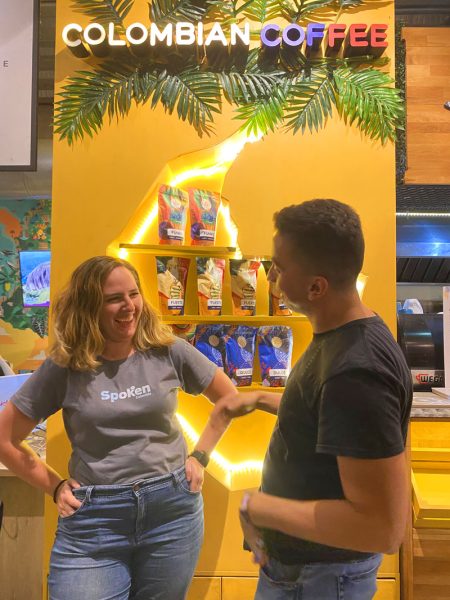Being able to speak Spanish, even at only intermediate level, has greatly enhanced my ability to navigate daily life, form relationships, and engage in local culture.

I am excited to share the following tips or advice that has helped me to overcome the language barrier and hope that they’ll do the same for you.
- Take language classes or hire a tutor – There are a number of language schools and private tutors in Medellin that offer classes, such as Spoken Language School at Los Patios Hostel Boutique in El Poblado. I found that I learned more quickly and retained more from their non-traditional (outside of the classroom) and interactive teaching methodology.
- Practice speaking with locals – Try to actively engage with locals and practice speaking Spanish with them. I regularly chat with my curious Colombian friends, industrious coworkers, and not to mention my adventurous volleyball social club members. Fortunately for me, I also get a lot of conversational practice with my loving Colombian wife. BE BRAVE and FEARLESS, making mistakes is part of the learning process.
- Watch Spanish language media – Watching Spanish-language TV shows, movies, and other media can help you become more familiar with the language and improve your listening and comprehension skills.
- Join language exchange groups, like the one every Wednesday evening hosted by Spoken at Los Patios Hostel: Find a group where you can practice speaking Spanish with native speakers, you will improve your language skills much faster.

There is no shortage of frustration that comes with learning a new language, but with time, effort, and practice, it can greatly improve your experience living in a foreign country like Colombia.
The difficulty of learning Spanish, compared to learning English, can depend on several factors, including your prior experience with language learning and your native language. However, there are some general differences between the two languages that can make one more challenging to learn than the other.
Here are the key differences between two languages:
- Spanish grammar is generally considered to be more straightforward than English grammar, with fewer irregular verbs and fewer exceptions to rules.
- Spanish pronunciation is also considered to be more straightforward than English, with fewer sounds and a more consistent relationship between written and spoken language.
- English has a larger vocabulary than Spanish, with many words borrowed from other languages, whereas Spanish is considered to have a more consistent vocabulary.
Some aspects of Spanish that may make it more difficult to learn for English speakers, such as the use of formal and informal address, and verb conjugation. Ultimately, the difficulty of learning Spanish versus English will depend on the individual learner and their prior experience with language learning.
As someone whose first language is not English, I can honestly say that I find learning Spanish easier because of its more straightforward grammar and pronunciation, while others may find English easier due to prior exposure to the language.
While Spanish has several aspects that may make it easier to learn compared to English, there are also some aspects that can make it more challenging for English speakers. Like the followings:
- Spanish has a more formal system of addressing people than English, with different forms of address used for family members, friends, acquaintances, and strangers. This can take some time to learn and may require careful attention to context and cultural norms.
- Spanish verbs have different conjugations depending on the subject pronoun, making verb conjugation a challenge for English speakers who are used to a more straightforward verb structure.
- Spanish vocabulary can be challenging for English speakers, especially when it comes to idiomatic expressions and slang. English speakers may also have difficulty with the many loanwords from other languages that are present in Spanish, such as Arabic and indigenous languages.
- Spanish pronunciation and accent can also be challenging for English speakers, especially when it comes to the difference between the sounds and intonation of the two languages.
Despite these challenges, I found that with time and practice, I was able to overcome these difficulties and become proficient in Spanish. It is important to be patient and persistent in your language learning journey, and to seek out opportunities to practice and use the language as much as possible.
“To have another language is to possess a second soul.” Charlemagne













